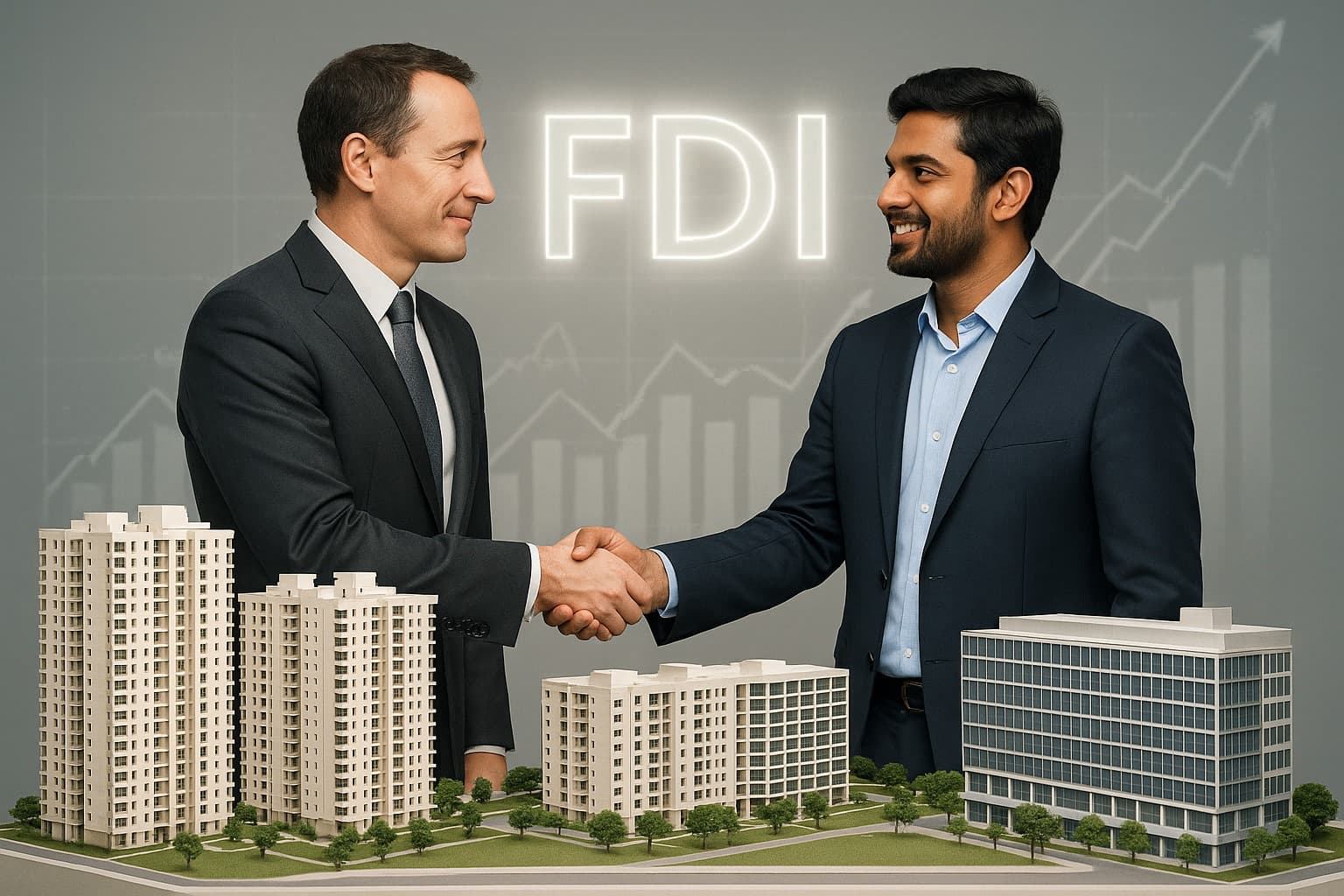FDI's Transformative Role in Indian Real Estate
Summary
FDI is transforming Indian real estate by injecting capital, expertise, and global standards. It boosts construction, improves living spaces, and drives housing demand, fostering urban growth and creating opportunities for investors and homebuyers.

India’s real estate sector is no longer just about bricks and mortar—it’s a thriving ecosystem shaped by global interest and investment. Over the past decade, FDI in real estate has become a game-changer, injecting not just capital but also innovation, professionalism, and global standards into the property landscape. From high-rise residential towers in Mumbai to sprawling integrated townships in Pune and Bangalore, foreign investment India is transforming how we live, work, and invest. Understanding how FDI is shaping Indian real estate and property development helps both investors and homebuyers grasp the immense opportunities this sector offers.
Why FDI is Crucial for India’s Property Sector
Foreign investment brings more than just money—it brings knowledge, technology, and credibility. India property FDI has enabled developers to adopt global construction standards, implement modern designs, and complete projects efficiently. This has raised the overall quality of real estate funding and helped establish trust in a market once seen as risky by international investors.
The impact of FDI on Indian real estate growth can be seen in cities like Mumbai, Bangalore, and Hyderabad, where foreign-backed projects have introduced world-class amenities, sustainable building practices, and modern township layouts. These developments attract not only domestic buyers but also high-net-worth global investors seeking global investment real estate opportunities.
FDI Inflows and Market Expansion
India has become one of the top destinations for foreign direct investment in Indian housing sector. Over the past few years, FDI inflows in Indian property market 2025 have steadily increased, fueling large-scale projects in residential, commercial, and mixed-use developments. These inflows provide the financial muscle for developers to undertake ambitious projects, from affordable housing schemes to luxury apartments and IT parks.
This steady flow of foreign capital also helps address the chronic challenge of population and housing mismatch. By funding more projects, FDI ensures that growing urban populations have access to quality homes, better infrastructure, and modern amenities. The result is not just better housing but stronger urban development.
Benefits of FDI in Indian Real Estate
The advantages of foreign investment in real estate are multifaceted. Some key benefits include:
Boost to the construction sector: The role of FDI in boosting Indian construction sector is undeniable, as large-scale projects now become feasible, generating employment and supporting related industries.

Technology transfer and expertise: Developers gain access to cutting-edge construction methods, sustainable practices, and global project management techniques.
Higher quality living spaces: Modern designs, better amenities, and timely project delivery increase buyer confidence and elevate lifestyle standards.
Infrastructure and urban development: FDI-backed projects often integrate schools, hospitals, retail spaces, and leisure facilities, supporting Indian cities development.
These factors collectively demonstrate the benefits of FDI in residential and commercial real estate in India, contributing to a robust and sustainable market.
FDI Policies Driving Growth
Government initiatives have been key to attracting foreign direct investment in Indian housing sector. Policies allowing up to 100% FDI in construction development and townships, subject to conditions, have encouraged investors to enter the market. These FDI policies and their effect on Indian property sector have improved transparency, reduced risk, and increased investor confidence.
By creating a clear regulatory framework, the government has helped FDI in real estate become a reliable, long-term source of funding. This clarity ensures that developers can plan larger projects without fear of delays or regulatory hurdles, while investors gain assurance of legal protection and financial viability.
FDI’s Impact on Housing Demand
Foreign investment does more than fund projects—it shapes housing demand growth in metro and tier-2 cities. Impact of foreign investments on India’s housing demand is particularly visible in cities like Mumbai, Pune, and Bangalore, where foreign-backed residential projects offer superior amenities and modern infrastructure. Buyers are more confident investing in these properties because they know that international standards are being met, ensuring both comfort and value appreciation.
Moreover, how FDI is shaping Indian real estate and property development extends to the commercial sector. Office spaces, retail hubs, and mixed-use complexes backed by FDI are creating vibrant urban centers that attract both domestic and international businesses, further driving housing demand around these hubs.
Commercial Real Estate and Global Interest
While residential developments have captured headlines, commercial real estate has also benefited immensely. Foreign direct investment trends in Indian real estate 2025 indicate growing interest in office parks, IT corridors, and retail complexes. FDI in commercial spaces has not only improved infrastructure but also increased employment opportunities, making urban centers more dynamic and sustainable.
These developments are particularly significant in tier-2 cities, which are emerging as new investment destinations. With rising FDI inflows, smaller cities now see real estate growth due to urbanisation, offering investors opportunities beyond the traditional metros.
Challenges and Strategic Opportunities

Despite its benefits, FDI comes with challenges. Large-scale foreign-backed projects may increase competition, drive up prices in premium segments, and require developers to meet strict compliance standards. Yet, these challenges also create opportunities for domestic developers to innovate, improve quality, and adopt global investment real estate practices.
For investors, understanding FDI policies and their effect on Indian property sector is crucial. By aligning with FDI-backed projects, they can benefit from timely project completion, superior construction quality, and strong returns on investment.
Looking Ahead: FDI and the Future of Indian Real Estate
The future looks promising. Foreign direct investment in Indian housing sector will continue to shape the property landscape, driving both residential and commercial real estate growth. With urbanisation, rising incomes, and increasing global interest, the impact of FDI on Indian real estate growth is expected to intensify.
Homebuyers can expect better amenities, modern designs, and faster project completion. Investors can anticipate strong returns, supported by FDI inflows in Indian property market 2025. Overall, FDI is creating a more transparent, professional, and globally competitive real estate market. Understanding how FDI is shaping Indian real estate and property development is key to making informed investment and purchase decisions.
Conclusion
FDI has transformed India’s real estate sector from a fragmented market into a globally competitive and professionally managed ecosystem. From residential housing to commercial complexes, FDI in real estate provides capital, expertise, and credibility. The role of FDI in boosting Indian construction sector is evident in modern urban landscapes, timely project delivery, and improved infrastructure. With favorable FDI policies and their effect on Indian property sector, global investment continues to reshape housing demand and urban growth. How FDI is shaping Indian real estate and property development makes it essential for investors, developers, and homebuyers to stay informed and strategically engaged.
Summary (100 words)
FDI has become a cornerstone of India’s real estate development, driving both housing demand and urban infrastructure growth. Foreign investment India provides capital, expertise, and global standards, transforming residential and commercial projects. FDI inflows in Indian property market 2025 are expected to increase, especially in metro and tier-2 cities, impacting Indian housing demand positively. Policies allowing 100% foreign investment and regulatory transparency ensure investor confidence and timely project completion. From high-rise apartments to IT parks and mixed-use townships, how FDI is shaping Indian real estate and property development highlights the immense opportunities for investors, developers, and homebuyers alike.
